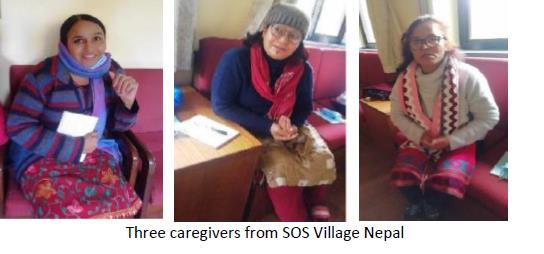The ICDP Nepal report 2020 includes a number of stories about the impact of ICDP – read below some of the stories:
Dipak Neupane, ICDP Facilitator and psychologist from the KOSHISH organization:
“As an ICDP facilitator, I was able to change my own perception towards a child and my way of interacting personally and professionally. The knowledge, skill and practice from ICDP training has given me more confidence to be a better caregiver and parent in the days to come. I understand ICDP as a simple and effective intervention that builds competence of caregivers in providing psychosocial care. It enhances children’s psychosocial development and wellbeing through emotional bonding, trust and better interaction between the child and the caregiver. Its impact on myself and the caregivers was commendable.
It was a great learning opportunity for me to work with children’s caregivers to help them create a loving, caring and guiding environment for their children. The caregivers got a chance to reflect on their own childhood experience and current caregiving practices which helped them to realize that caregiving practice could be improved.
Being a mental health professional, I used to believe that only experts can provide guidance on better parenting. After taking ICDP, I realized that empowering the child’s parents or other caregivers through training, orientation and supervision is the best way to ensure proper care and overall wellbeing of a child.
The KOSHISH organization works in the field of mental health and psychosocial wellbeing. In the community mental health program, I deal with emotional and psychosocial needs of children whose parents are suffering from mental and psychosocial problems. Sensitization of parents and caregivers whose family members are suffering from psychosocial issues was always challenging for me. Now, by incorporating ICDP techniques in the psychosocial counselling process with child, family and relationship counselling has proved to be very effective. This technique is also helpful and effective in the KOSHISH school mental health programs in which I closely work with teachers, parents and students. As a facilitator, I find it important to encourage and promote locally appropriate practice of caregiving as well as respect for cultural beliefs of the community regarding the care of children.
Caregivers said that their communication patterns with their children have changed, as follows:
They provide more explanations and include the child in conversations. They have become better listeners. Many mentioned that they see their child as a human being of value now, they are aware of its needs beyond purely physiological needs. They mentioned how they spend more quality time with their children now. The conversations in the caregiver meetings and the progression of attitude from the first meeting to the last one, also indicate actual changed practice. Likewise, many shared how they realized the importance of parents as primary caregivers and said that the ICDP program made them sensitive towards spending quality time with their children and aided them in understanding the child deeply – whereas they used to leave the child in the hands of secondary caregivers, hardly developing any attachment to their children. Quite a few said they used to spank their children when they misbehaved but ICDP helped them to regulate positively and protect the child from negative behaviours and activities. “
Statements from three caregivers from SOS Village Nepal who received ICDP training:
“My two youngest children under my care, daughter (8 years) and son (9 years) used to talk to me only when necessary. However, they were seen casually talking with their SOS siblings. I used to feel that I missed out. I even asked them whether they were afraid of me; they replied ‘no’. I wanted them to come and chat with me as they did with their SOS siblings. Gradually, after ICDP, I started to participate more in their activities and to talk about the happenings around, as well as to listen to their stories attentively and with interest – as a result and to my surprise, they started to come to me voluntarily to chat, to share their stories. I am now happy that my children and I are very close and I feel ICDP helped me to connect with my children. Thank you ICDP. “
“I saw a roughly folded blanket and then pointing at that blanket, I asked who accomplished that. When my 10 years old son Ravi (name changed) said he did that, I remembered ICDP and praised his effort. Next day, Ravi in a joyful manner pulled my hand towards his room, to show me his bedroom. I asked him who tidied up the bedroom so early, and I was surprised when he said that he folded not only his blanket but also his brothers’ blankets. He sounded very happy and motivate after my acknowledgement.”
“My youngest sons (in grade 1,2, 3,4) insisted to keep chicken as pets. I explained the organizational structure and rules of the SOS Village. They, especially the youngest one, kept on insisting that we should keep chicken. Then one day, I explained the consequences of bringing chicken and together we set limits (mother will not feed the chicken and will not clean if chicken make dirt around; and if they don’t look after the chicken properly she would return the chicken back). It is so amazing to see all my sons doing their duty diligently. They are enjoying it so much and they themselves set the routines, taking turns to clean and feed. I really feel ICDP has a magical concept.”

